“Oh Brouni! Oh Brouni!”
Panicked, my eyes darted around for someone who could help me. I looked left, right, but this incessant song repeated. Was this some sort of sick joke rekindled from childhood with everyone in but me? The chanting intensified and I stood there paralyzed and bleary eyed after a sleepless night of slobbering against an airplane window.
A blonde American in Ghana, I was prepared to stand out, I thought, but this was just plain rude. Where was this alleged man named Happy whom I was promised would pick me up from the airport? An interesting name, I began to wonder if I made him up in my head. Hmmm… I cursed my frazzled, throw-it-all-in-the-bag packing style, having left his contact info somewhere in Ohio. And why did I have to be such a free-spirited girl, insisting I travel disconnected?
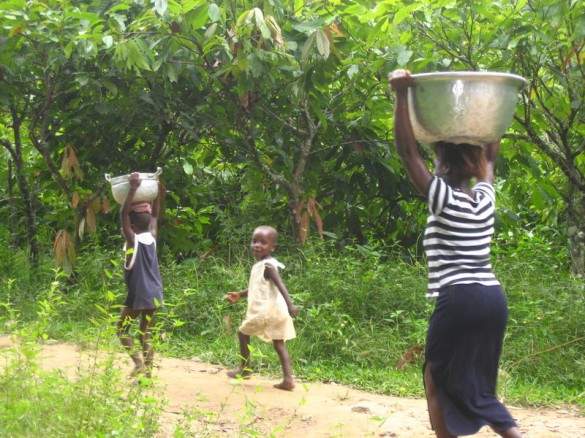
“Calm down, Krissy,” I told myself, “deep breaths. Count to ten.”
Having backpacked before, I reassured myself that I would not get lost in translation at the Kotoka airport, I hoped. I must have looked like I was on the verge of tears, or I risked potentially murdering everyone, because just then a police officer came and asked if I was lost.
“No sir,” I replied. “I don’t think I’m lost, but more like stranded. You see, I’m supposed to be picked up by the organization I’m working with. But I’m afraid I don’t have his contact info…or a phone.” I smiled sheepishly and shrugged.
“Well,” he said, “that is unfortunate, little Obrouni, but I don’t think I can help you, unless you want to take a taxi to your home.”
I looked briefly at the swarm of hungry taxi drivers, hissing with excitement ready to inflate their prices and dismiss me as an Obrouni, whatever that meant…
“No, that’s okay. I think maybe I’ll just wait here a little longer,” I let him down gently.
“Okay, little Obrouni. But if you do not find what you are waiting for, I will let you sleep in the airport.”
Well, that was promising, I thought.
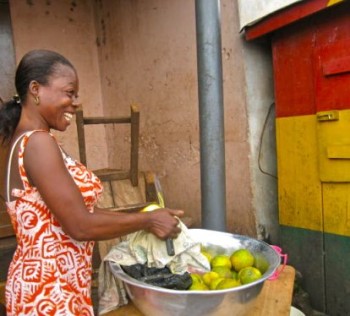
I slumped onto my backpack and hastily questioned why I graduated from college a year early. I could be home comfortably writing papers! But no, the wanderlust wins every time and sucks me back in. For the next few months, I would be educating mothers and children of a remote village in Western Ghana, that is, if I ever left the airport.
An hour later, a man tapped me on the shoulder and greeted me with a smile that stretched from sweaty ear to sweaty ear. I looked up from the pavement and asked with trepidation, “Are you Happy by any chance?”
Snap! He grabbed my hand, shook it lightly, and snapped his middle finger against mine, a popular Ghanaian handshake. “Yes, that’s my name, Miss Kris Kris. Are you ready to go now?”
I hugged that sweaty little man like I would never see him again. And we were off. To where? I didn’t really care, as long as I wasn’t sleeping in the airport tonight.
The weeks that followed in my new home were enswathed in mosquito netting. While my main purpose in Ghana was a health initiative, I couldn’t help but engross myself in the alluring food, genuine people, and sparkling culture surrounding the famous phrase, “Akwaaba” or Welcome.
As a quirky vegetarian and wannabe Food Network star, food is always a topic of contention while traveling to foreign places. “What? You don’t eat no meat?” No, I don’t. And it was no obstacle in Ghana, as meat is considered a sign of great wealth and luxury. Phew.
Volunteering, I and my peers were fortunate to have our own chef to cook us two meals a day. Each night we would inspect the menu tacked to the wall of our little abode and curiously take stabs at the mysterious tastes of Jollof Rice and cocoyams. I wondered, would they taste like chocolate? (They don’t).
Should you be brave enough to handle some spice in your life, the Ghanaian diet is one of simplicity and zap. It centralizes around starches, thick stews, and of course, their major export, palm oil.
Fastina, our cook, was the Paula Deen of Ghanaian cooking, and in my eyes she was perfect. Her specialties were Groundnut soup (a slightly spicy peanut butter soup) served with big softballs of rice, Jollof Rice (a tomato-based rice dish), fried plantains, Nyadowa (a stew made of garden eggs, an egg-shaped tomato impostor grown in Ghana), a dish called Red Red (a surrogate to the starchy stews, it is a spicy red mash served with fried red plantains) and lastly, fufu, by far the most fun to say, fun to eat, and fun to make!
I was lucky enough try my hand at making this ubiquitous dish, a pulverized blend of boiled cassava, yam, or plantain. Pounding fufu is not for the faint of heart, I’d soon discover.
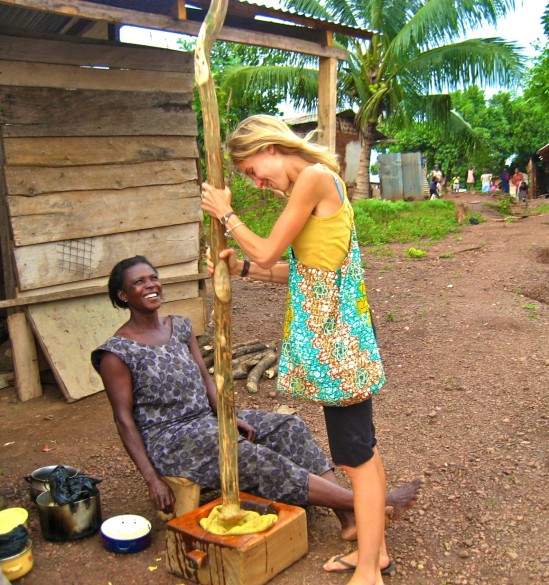
To begin, my fufu mentors boiled separate pots of yam and plantain over a fire pit until tender, and after what seemed like forever we were ready to punish them. I was still uncertain what this mythical “pounding” demanded, but nonetheless I was ready to become a believer.
The next thing that happened will forever dance in my memory. A stick the size of my body was lifted and dropped in a meticulous, rhythmic display of caution and heroism. One person stands as the commander of the stick, while another person keeps watch over the vegetables. Once the starches are broken down, a glutinous paste begins to form.
Hypnotized by the mesmerizing show, I was immediately snapped back to reality when it was my turn.
“Here Kris Kris,” said Happy, handing me the tiny tree. “You pound now.
Self-conscious of my abilities, I dubiously reached out for the branch ready to begin my fufu career. That career lasted all of two minutes when I discovered pounding fufu is an arduous battle. At least I was a good laugh for my Ghanaian conquerors. Once I relinquished my post, the process was much quicker. The two pots were combined and then pounded to form a giant ball of, you guessed it, fufu.
Served floating in a variety of soups, the mini fufu iceberg is eaten by pinching off a little chunk, dipping it in the soup, and swallowing.
“You do not chew, just swallow” I was instructed by my fufu gurus.
An interesting idea for someone who relishes texture. The consistency was that of bread dough, and the aftermath was that of a small yam-baby cultivating in my abdomen. It is obvious why fufu is a staple in Ghana. It sticks with you, providing sustenance for long hours spent on the farm.
Although home cooked meals are an integral and revered feature of Ghanaian cuisine, an invitation to eat is not always available. When this happened, we looked no further than the streets. Street food is always an unnerving, yet rewarding adventure in foreign cities, and no country caters authentic cuisine quite like Ghana.
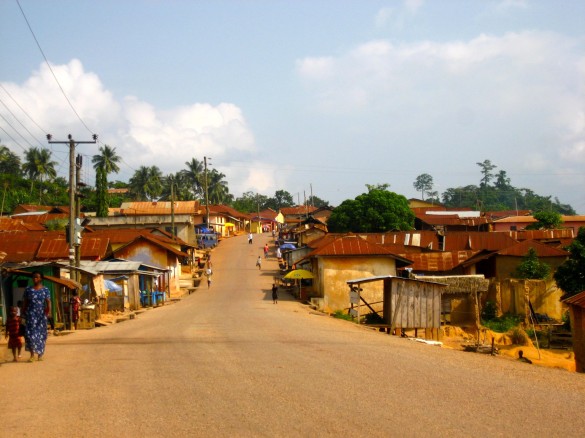
A quick taxi ride to market, my fellow volunteers and I sat white-knuckled as our driver overrode our Western traffic laws, the speedometer ticking 60 mph. I was cautioned about taking taxis at night, and now I know why.
(A Tro-tro is another form of transportation in Ghana. Often a dilapidated van turned into a make shift bus with inserted bench seats. Rides are always an affordable and fun form of transportation. Beware, however, you will most likely be sardined with other passengers en route to your destination, gasping for air from the cracked window.)
Kissing the ground upon arrival, I found myself catapulted to an alternate dimension. From roasting corn on the cob, to salted, pungent fish, this beautiful, chaotic maze had it all. Next to the bus station and other commuter hubs, I was told is the best place to find authentic street food.
“Obrouni! Obrouni!” there it was again, that annoying little taunt, I thought to myself.
I looked up, way up, to the giant wooden boxes housing various Ghanaian treats and snacks, all carried on top of the heads of prodigious women, all anxiously awaiting our patronage and cedis, the Ghanaian currency. Fried dough of endless shapes and sizes, plantains and fritters stacked like neat rows of toy soldiers. There were plastic bags filled with intriguing critters, and basins where rice and stew were rationed to famished passersby.
A favorite among locals, I bought Kenkey, a slop of mashed corn, gift wrapped in a banana leaf, and a bar of groundnut toffee, a twin sister to peanut brittle, which I liken to crack cocaine due to its addictive qualities.
Lastly, no day in Ghana would be complete without sucking on a sublimely icy treat. What dreams are made of, its presence is advertised with a honking horn and a portable cooler.
Fan-Milk, Fan-Choco, and Fan-Yo are packets of ice cream or yogurt, and I am still waiting for it to hit my grocery store’s shelves. Senses on overload, we braved the winding road home, bounty in tow and feeling cool.
Back home on the ranch, we were greeted by our usual swarm of children with their outstretched hands and smiles that could melt the coldest of hearts.
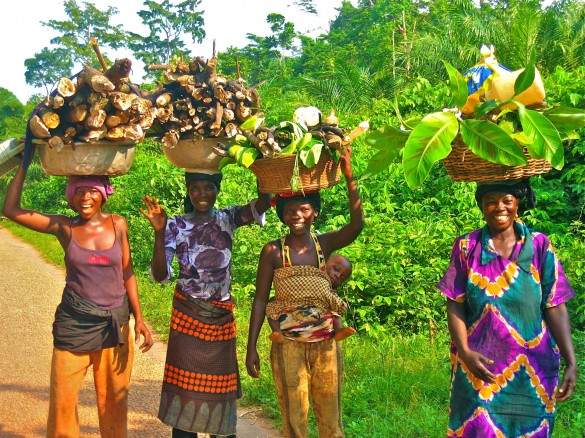
Later that night we found ourselves at the village bar aptly named Sister Comfort’s, with our local staff members, who through the passing weeks evolved from neighbors to family members.
“Are you ready now to taste what real drink is?” asked Albert, one of the staff members, referring to the infamously hallowed drink of Ghana.
How bad could it be, I wondered? I survived the cheap college drinking days of drugstore vodka, I was confident I could handle a little Akpeteshie. Nothing could have prepared me for what I ingested next. A local gin with an undocumented, but scandalously high alcohol content, it could have been black-marketed as a glamorized rubbing alcohol. With one swift chug, the valiant men braved the poison as the women watched with knowing smirks.
“They stupid, huh Kris Kris,” said Rose, a village seamstress and newfound friend.
“Ya, Rose, they stupid,” I agreed with a nod.
She looked at me with raised eyebrows, I looked at her, and we both burst out with the most contagious melody of giggles. Wiping her eyes, she said, “You know, you always be welcome here, little Obrouni.”
Unlike my first day, I smiled at my new nickname. I’d learned that “Obrouni” simply meant “white person” in Twi, the official language of my village. It was not a form of insult nor degradation, and to be honest, I sort of became fond of it.
Sitting in a flimsy lawn chair in Ghana, among lizards and fist-sized spiders, while choking down putrid alcohol under a seamless blanket of stars, I realized, I have never before felt more welcome.